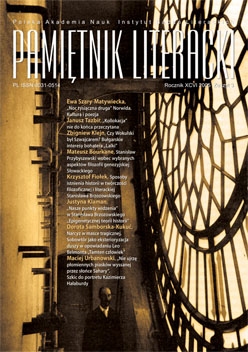„Nie ujrzę płomiennych piasków wyssanej przez słońce Sahary”. Szkic do portretu Kazimierza Hałaburdy
“Nie ujrzę płomiennych piasków wyssanej przez słońce Sahary” (“I shall not see the fiery sands of Sahara sucked by the sun”). A Sketch to the Portrait
Author(s): Maciej UrbanowskiSubject(s): Literary Texts
Published by: Instytut Badań Literackich Polskiej Akademii Nauk
Keywords: K.Hałaburda; the circle “Klub Włóczegów”; the political movement “Ruch Narodowo-Radykalny”; “Falanga”; “Prosto z mostu”
Summary/Abstract: Maciej Urbanowski reconstructs the life of Kazimierz Hałaburda (1903–1942). He reminds that Hałaburda was one of the leading figures of the young literary Vilnius of the 20’s and 30’s in the 20th century. Hałaburda belonged to the circle called Klub Włóczęgów and wrote poems characteristic of this intellectual group. In 1931, accompanied by Tadeusz Bujnicki, Jerzy Zagórski, and Czesław Miłosz, he took part in a soirée, which initiated the Żagary formation. His nationalistic sympathies gave rise to his conflict with Żagary. In the 30’s, he joined the political movement Ruch Narodowo-Radykalny and published articles and poems (e.g. in “Falanga” and in “Prosto z mostu”) favoring the program of the “national revolution”. As Urbanowski emphasizes, they express a disappointment at The II RP (The 2nd Polish Republic), the democracy, and the fascination with totalitarian system, which were typical of this generation. After the outbreak of the WW II Hałaburda remained in Vilnius and worked for Józef Mackiewicz’s “Gazeta Codzienna”. Arrested by NKWD (National Committee for the Internal Affairs), Hałaburda died shortly after his return from the exile.
Journal: Pamiętnik Literacki. Czasopismo kwartalne poświęcone historii i krytyce literatury polskiej
- Issue Year: 2005
- Issue No: 3
- Page Range: 131-153
- Page Count: 23
- Language: Polish

